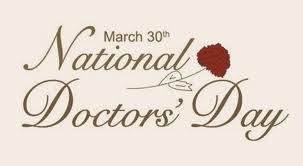So this year, when I got a very nice compact umbrella, I tried to recall how far back this custom went and decided to look it up. It appears March 30, 1991 was the first National Doctors' Day.
What does it take to establish a national day (or week or month) for something? As you probably know, it's an Act of Congress. Specifically, this was a Joint Resolution "to designate March 30, 1991 as National Doctors Day."
Whereas society owes a debt of gratitude to physicians for the contributions of physicians in enlarging the reservoir of scientific knowledge, increasing the number of scientific tools, and expanding the ability of health professionals to use the knowledge and tools effectively in the never-ending fight against disease; and
Whereas society owes a debt of gratitude to physicians for the sympathy and compassion of physicians in ministering to the sick and in alleviating human suffering: Now, therefore, be itResolved by the Senate and House of Representatives of the United States of America in Congress assembled, That--
(1) March 30, 1991, is designated as `National Doctors Day'; and
(2) the President is authorized and requested to issue a proclamation calling on the people of the United States to observe the day with appropriate programs, ceremonies, and activities.
[For those of you who have trouble with apostrophes, that's supposed to be a plural possessive, and the way it's spelled in the title of this essay is correct. The only argument supporting the official spellings "Mother's Day" and "Father's Day" is that each of us has only one mother and only one father. While that's true biologically, our biological parents aren't necessarily the ones we're honoring on those days, and with blended families and same-sex couples.... But I digress. The American Medical Association spells it correctly. The original spelling as found in the Congressional Record is incorrect. What a surprise.]
 |
| Crawford W. Long, M.D. |
Why March 30th? The answer seems to be Crawford Williamson Long, MD. Dr. Long was a north Georgia physician credited with the first use of ether as a medical anesthetic on March 30, 1842. The first Doctors' Day was observed in Georgia on March 30, 1933. The US House of Representatives adopted a resolution commemorating March 30, 1958 as Doctors' Day. But it was not until 1990 that the above-cited Joint Resolution, signed into law by George H.W. Bush, made it official for 1991.
This is very fitting. The medical profession is devoted to alleviating suffering, and Dr. Long's pioneering effort had the purpose of enabling doctors to perform therapeutic procedures for patients without inflicting pain.
The Congressional Record is surely full of designated national days. However, a fair amount of Web searching this morning failed to turn up a compiled list of them. There are plenty of Web sites that have lists, but they all seem to include many that are invented, whimsical, or just plain silly. Not that Congress has never done that sort of thing, but I couldn't find a list of days that had been officially designated by Congress. Maybe I just wasn't using the right search terms.
But why one for doctors? Are they under-appreciated? Remember, we're talking about a profession that is highly respected and whose practitioners are financially rewarded for the many years of education and training required to become physicians and the additional many years of their lives they devote to saving lives, restoring health, helping patients to manage chronic disease, and comforting the afflicted. Don't they feel sufficiently appreciated without a special day to honor them?
Maybe they do. But on National Doctors' Day I think about one group of doctors who definitely are under-appreciated. The new ones. The young physicians still in training. The ones who have graduated from medical school and are in graduate medical education programs learning their chosen specialties. It is my privilege to work with them every day at an academic medical center, where I see just how under-appreciated they are. They work more hours than anyone else in the building. They have a high-stress job for which they are under-paid. They never have enough time to sleep, to get a little exercise to stay fit and healthy, to spend with their families, or just to relax and read a non-medical book once in a while. They literally (and I mean that in the correct sense of actually, truly, and really) exude blood, sweat, and tears in putting forth the effort required of them to care for their patients. And yet they are, all too often, treated - by patients, by nurses, and by their teachers - as though they are not yet "real doctors."
Will we have a national day to honor and appreciate them? Unlikely. We just expect them to wait, as they do for everything else, until they have completed their training and have arrived at the point at which they will be considered "real doctors." But the doctoring they do each day they come to work is very real. And I want them to know they are appreciated now.
National Doctors' Day is for you, my friends. You know who you are, and you know you earn this appreciation every day.

Really nice post thanx for sharing for more
ReplyDeletefunny doctor quotes